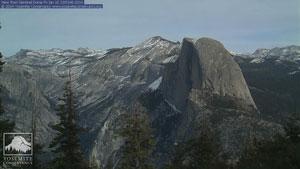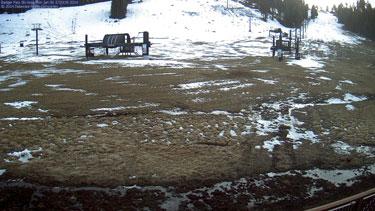Winter snows may have arrived in abundance in some parts of the country, but it's a different story so far in California, where the first snow survey of the season has already raised concerns for the coming summer. At Yosemite National Park, skiers have more immediate concerns, with the Badger Pass Ski Area not yet open for the season.
The importance of adequate snowfall in High Sierra areas such as Yosemite is summed up by the state's Department of Water Resources (DWR): "The snowpack normally provides about a third of the water we use in California as it slowly melts into streams and reservoirs in spring and early summer."
"More Bare Ground Than Snow"
That statistic alone explains why results of the year's first snow survey are prompting early worries in the state. Earlier this week the DWR reported that its "first snow survey of the winter found more bare ground than snow."
According to an agency spokesperson, "Manual and electronic readings record the snowpack's statewide water content at about 20 percent of average for this time of year." Figures are lowest in the northern mountains, which are at 11 percent of normal for the date. The last time California's statewide snowpack was this dry was in 2012, when it also was 20 percent of the historical average.
A Dry Trend, Winter and Summer
The readings today and in 2012 are also the driest on record, says the DWR, and concerns are compounded by last year's sparse rainfall; many areas of California ended calendar year 2013 with the lowest rainfall amounts on record.
Officials in the state are already planning ahead, in case the trend continues.
'While we hope conditions improve, we are fully mobilized to streamline water transfers and take every action possible to ease the effects of dry weather on farms, homes and businesses as we face a possible third consecutive dry year,' said DWR Director Mark Cowin. 'And every Californian can help by making water conservation a daily habit.'
That combination of low winter snow and skimpy rainfall at lower elevations during three consecutive years also raises worries about wildfires in a state where major incidents such as the Rim Fire last fall are still fresh in the minds of many locals. A recent report prepared for the San Francisco Public Utilities Commission says the cost of that one fire to local economies could be over $700 million.
Yosemite's Snow Courses Offer Valuable Historical Data
Measurements of the annual snowpack come from a combination of electronic sensors and old-fashioned hand measurements taken at specific spots in the mountains, known as snow courses. Data from Yosemite is especially valuable because it allows annual comparisons over a long period of time; records from some of Yosemite's snow courses date back to 1930.
While the year's state-wide water worries overshadow recreational issues, fans of the Badger Pass Ski Area are also feeling the pinch'the area has not yet opened for the season. The on-line "Badger Pass Ski Conditions and Snow Report" sums up the problem: "CLOSED UNTIL THERE'S MORE SNOW." Officials for the ski area are putting the best possible face on the situation, noting on the website, "We're just one good snow storm from opening for the 2013/14 Ski Season."

The High Sierra webcam view of Yosemite on January 10. Image from Yosemite Conservancy.
Still Plenty of Winter Ahead
There's certainly reason for that optimism, since there's still a lot of winter ahead, and it's true that one or two major storms can make a big difference in the situation. Ted Thomas is a spokesperson for the DWR, and he notes that half of the years with similarly dry first quarters caught up to average by the end of the season.
At present, however, the Yosemite webcams showing views of areas such as Yosemite Falls, Half Dome, the High Sierra and Badger Pass display very little of the eagerly-anticipated winter's snow.
There's certainly plenty to see and do in Yosemite, with or without snow, but If you're headed to the park in coming days in hopes of enjoying some snowshoeing and skiing, it would be a good idea to have a "Plan B."


 Support Essential Coverage of Essential Places
Support Essential Coverage of Essential Places







Comments
Yes, it's been very very dry in Northern California. Last year's summer in the mountains was a bit ruined by the smoke coming every afternoon from the various fires. If we don't get rain soon (and it does not look good right now for January), it's going to be a long dry summer. Of course, all of us should be pulling our lawns and replacing them with something more drought resistant. And I may do just that.
10-4 Lee, just being lazy here, but name and author, I will have to read it now.
The cheeseburger story was in Andrea Lankford's National Park Confidential. You'll really enjoy reading it. You probably worked with her in YOSE didn't you?
I'd be very interested to learn what you think of the book if you did work with her. Some of it seemed a bit over the top, but then again YOSE and GRCA and other places like them are over the top for sure. I still found myself wondering when I read it just how accurate it really was.
Yeah, I never have figured out why we agreed to send you our water. But then, parts of CO have been just as irresponsible in overbuild.
PS: you will happy to know we got another foot of snow today. Cost me a buck twenty-five to get towed out while being greedy - I mean, trying to earn a living - but its just the cost of living in paradise. Go Broncos!
Hi Lee, I'm so glad you enjoyed my book. Though I am certainly quilty of using hyperbole to get a laugh form time to time (perhaps the Superintendent in question didn't exactly look like he was one cheeseburger away from a heart attack :) but he was certainly sweaty and red from hiking the Bright Angel trail) I assure you the book is accurate. All the events happened and are written from the perspective of either myself or the many people I interviewed.
Forgive me if defending myself here is in poor taste. but dang, I worked long and hard on that friggin' book! Hours and hours of recorded interviews. Boxes and Boxes of incident reports. If you have doubts about a particular incident being "over the top" I'd be happy to discuss it with you.
I'm sorry, Andrea, if my comment itself was over the top. The day I posted that, I was under the influence of copious quantities of cold medicine trying to relieve a terminal case of the super sniffles.
Right now, I can't recall exactly which parts of the book made me sort of raise my eyebrows. It wasn't so much the stories as what I perceived as what I thought was some bitterness or other negative emotion that was creeping into the text. But on the other hand, as one who has had a fair amount of experience with senseless death and dismemberment, I do understand how that can happen.
My NPS memories are from a time that was much different than it is now. Even Yosemite, wild as it was then, appears to hold no comparison with today. And on my last trip to GRCA's south rim in winter, I was horrified by all the people who simply hopped over low rock walls to bop along the very edge of the precipice while dancing on sheets of ice. I mean, we are talking dozens of them!
I came away from reading your book fearing that too many good rangers -- like too many police officers, firefighters, and medics -- are being shoved by budget cuts, personnel constraints, and other factors into some of the most God-awful things anyone can imagine with no hope for rest or respite. Am I wrong in believing that you simply burned out? If so, you're certainly not alone.
Thank goodness there are still people out there willing to do that kind of work.